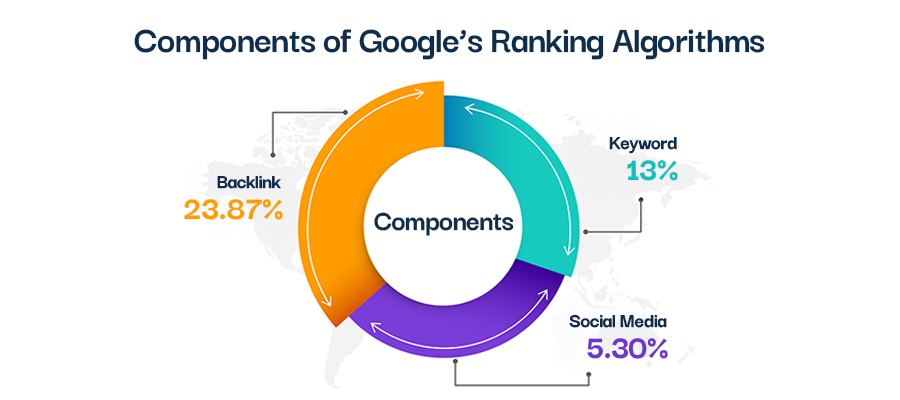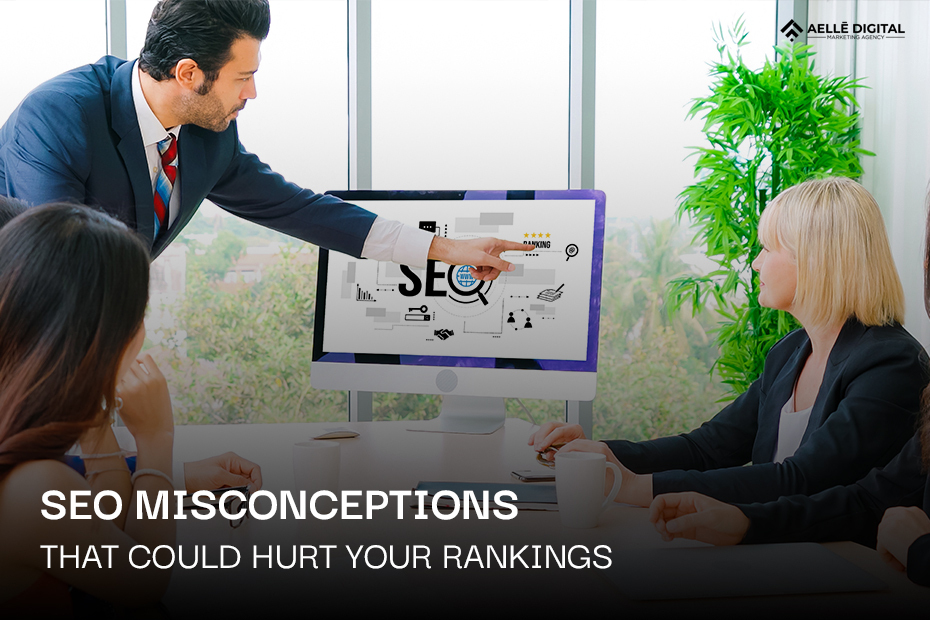You’ve probably heard the old saying, “Don’t wake a sleepwalker, or they’ll never wake up,” or maybe you’ve been told that sugar makes kids hyper. What do these statements have in common? They’re all myths. In fact, waking a sleepwalker isn’t dangerous, and studies show no clear link between sugar and hyperactivity.
Similarly, when it comes to SEO, plenty of misconceptions can lead you down the wrong path. From thinking more keywords equal better rankings to believing that SEO is something you can set and forget, these SEO myths can damage your chances of success without realizing it.
If you’ve ever felt your SEO efforts aren’t paying off despite following “best practices,” you could be following some of these SEO misconceptions. Dive in to understand the SEO myths holding you back in 2024.
Common SEO Misconceptions in 2024
A recent study found that over 70% of small businesses struggle with SEO, often due to misunderstanding its core principles. In a world of evolving search engines, relying on outdated SEO strategies that hurt rankings can’t bring any change. But do not get frustrated; we’re here to help you debunk those common SEO misconceptions that are sabotaging your success.
1. SEO is a “One-and-done” Process
Many believe that SEO is something you can set up once and then forget about, expecting continuous results. This misconception often leads to disappointing rankings and poor website performance in search results over time.
As Google’s algorithm evolves, so does SEO. This means that what works today might not be as effective tomorrow. Search engines must crawl, index, and evaluate your site so you won’t see major changes overnight. New competitors, content changes, and search trends all affect fluctuating rankings. To stay competitive, consistently monitor, tweak, and improve your SEO strategy over time.
- Can a Single Optimization Help You Stay Ahead Forever?
Search engine algorithms change constantly. Google updates its algorithm around 500-600 times a year. If you optimize your site once and think your job is done, you risk falling behind competitors consistently improving their SEO strategies. Even if you see results quickly, standing still means falling behind. That ‘single optimization’ might only keep you ahead for a short while.
- Why SEO Requires Continuous Improvement?
Google alone rolls out 3,200 algorithm updates every year. As user behavior evolves and new competitors enter the market, your SEO strategy must also evolve. This means you need to stay on top of trends, update old content, and continually optimize your website’s performance. Therefore, neglecting proper SEO strategies that hurt rankings means falling behind, losing valuable traffic, and slipping down the rankings.
2. Keyword Stuffing Improves SERP Rankings
A persistent SEO myth is that cramming a webpage with as many keywords as possible will enhance its ranking. It’s easy to fall into this trap, especially when trying to target several search terms at once. But in reality, this old-school tactic doesn’t work anymore.
In detail, Keyword stuffing means stuffing your content with keywords. You might think indexing your page with keywords will push you up the rankings, but this misconception is more dangerous than ever in 2024. When search engines detect keyword stuffing, your website could face penalties, such as being pushed down the rankings or removed from search results forever.
-
Why You Should Not Practice Keyword Stuffing?
Search engines value content that’s readable and helpful. Overstuffed content looks spammy and hard to read. When users land on a page filled with awkward, repetitive keywords, they’ll likely leave. This will hurt your bounce rate and reduce your site’s dwell time, both of which negatively impact your site’s credibility.
-
How Effective Keyword Integration Results in Smart SEO?
Effective SEO today requires a balance between content quality and keyword usage. Instead of jamming the same term 50 times into a page, use your primary keyword naturally while sprinkling in related terms, also known as Latent Semantic Indexing (LSI) keywords.
3. Link Building is Dead
There’s a growing myth that link building no longer matters for SEO, but nothing could be further from the truth. However, backlinks are still one of the most powerful ranking factors. In fact, backlinks account for about 23.87% of how Google ranks websites.
Some businesses once tried to game the system with link farms and excessive link exchanges. While these manipulative techniques are no longer effective (and will get you penalized), quality link-building is still alive.
-
Is SEO All About Purchasing Links?
Buying links is a black hat tactic that can severely harm your site. According to Google’s Webmaster Guidelines, purchasing links that pass PageRank is strictly prohibited. The focus should be earning links from reputable sites through valuable content and outreach.
-
How To Check The Relevance Of A Link?
Not all links are created equal. A backlink from a high-authority, relevant site is far more valuable than a hundred links from unrelated or low-authority sites. Use tools like Ahrefs or SEMRush to check websites’ domain authority and relevance before pursuing backlinks.
4. Social Media Doesn’t Affect SEO
A common SEO misconception is that social media has no bearing on search rankings. While social media may not directly impact your rankings, it still plays a significant role. Google has stated that social signals (likes, shares, etc.) are not direct ranking factors. However, there is a relationship between social media activity and SEO.
Social signals measure how people interact with and share your content. When your content is relevant and creative, it increases the likelihood of driving more traffic to your website. This boost in traffic can lead to additional backlinks, brand mentions, and, ultimately, improved SEO performance.
-
How do social signals play a role in search engine algorithms?
Social media helps distribute your content, driving more traffic to your site. Content shared on social media platforms often attracts links, which are vital for SEO. The more traffic and engagement your site receives, the more likely Google is to see it as valuable.
-
Why You Should Avoid Flawed Advice About SEO From Social Media?
SEO advice that goes viral on social platforms is often oversimplified or outdated. It’s easy to fall for clickbait tips, so always cross-reference your information with trusted SEO resources, including Google’s guidelines. Misinformation runs rampant on social media platforms. Stick to trusted sources when implementing SEO strategies, and be wary of ‘SEO hacks’ that promise overnight results.

Achieve Higher Rankings & Beat Algorithms With Aellē Digital Marketing
Misguided beliefs about SEO can significantly hurt your site’s visibility. Avoiding these SEO mistakes and staying updated with the latest practices is crucial for success. Remember, SEO isn’t magic; it’s a long-term strategy that requires effort and adaptation. With us at Aellē Digital Marketing, Los Angeles, you can implement smart and effective SEO strategies that work. Hence, avoid the common SEO mistakes that hurt your rankings and start growing your organic traffic today. Contact us today to build an SEO plan customized to your business needs.



